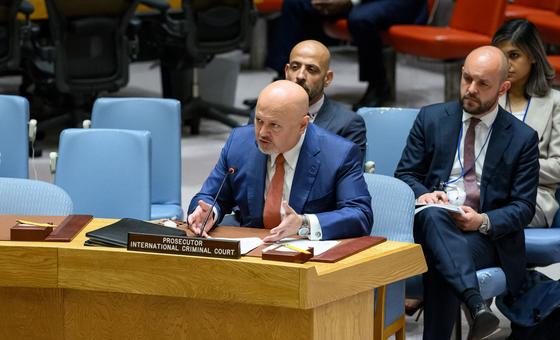In a statement, ICC Prosecutor Karim Khan said that there were reasonable grounds to believe that Hamas’s Yahya Sinwar, Mohammed Diab Ibrahim Al-Masri (Deif) and Ismail Haniyeh “bear criminal responsibility” for murder, extermination and taking hostages – among numerous other crimes – since the Gaza conflict erupted in the wake of Hamas-led attacks in southern Israel on 7 October.
There are also reasonable grounds to believe that Prime Minister of Israel Benjamin Netanyahu and Yoav Gallant, Israeli Minister of Defence, are responsible for other crimes and crimes against humanity “committed on the territory of the State of Palestine”.
These include “starvation of civilians as a method of warfare as a war crime…intentionally directing attacks against a civilian population (and) extermination and/or murder”.
Although the ICC is not a UN organization, it has an agreement of cooperation with the United Nations. And when a situation is not within the Court’s jurisdiction, the UN Security Council can refer the situation to the ICC, granting it jurisdiction.
To complement the allegations, Prosecutor Khan, a British national born in Edinburgh, noted that his Office had interviewed victims and survivors of the 7 October Hamas-led terror attacks in Israel.
This included former hostages and eyewitnesses “from six major attack locations: Kfar Aza, Holit, the venue of the Supernova Music Festival, Be’eri; Nir Oz and Nahal Oz.
“It is the view of my Office that these individuals planned and instigated the commission of crimes on 7 October 2023, and have through their own actions, including personal visits to hostages shortly after their kidnapping, acknowledged their responsibility for those crimes,” Prosecutor Khan said.
“Speaking with survivors, I heard how the love within a family, the deepest bonds between a parent and a child, were contorted to inflict unfathomable pain through calculated cruelty and extreme callousness. These acts demand accountability,” he added.
Turning to the hostages still believed to be held in Gaza, the ICC official noted that his Office had interviewed victims and survivors and that this information along with other sources indicated that they had been kept in inhumane conditions with some subjected to sexual violence, including rape.
“I wish to express my gratitude to the survivors, and the families of victims of the 7 October attacks, for their courage in coming forward to provide their accounts to my Office,” Prosecutor Khan said. “We remain focused on further deepening our investigations of all crimes committed as part of these attacks and will continue to work with all partners to ensure that justice is delivered.”
Rafah exodus continues
Meanwhile, at least 810,000 people have fled Rafah in just two weeks, UN humanitarians said on Monday, amid reports of ongoing Israeli military operations in the southern city and in the north of the enclave.
“Every time families are displaced their lives are at serious risk. People are forced to leave everything behind looking for safety. But there’s no safe zone,” the UN agency for Palestinian refugees, UNRWA, said in a post on X.
Accompanying the alert, images showed families with their belongings piled high on the back of cars and makeshift trailers; another photograph taken overlooking the coastline showed a mass of shelters for the displaced, all made out of simple sheeting and stretching all the way to the horizon.
Death toll rises
According to the Gazan health authorities, at least 35,300 Gazans have been killed and more than 79,260 injured amid Israeli shelling since Hamas-led attacks in Israel on 7 October left some 1,250 dead and more than 250 taken hostage from southern Israel.
Latest data from UNRWA’s online logistics platform indicated that the delivery humanitarian aid has stopped almost entirely via the main entry points to Gaza via Rafah and Kerem Shalom in the south.
Amid an escalation of military activity in eastern Rafah, no UN relief supplies reached the enclave on Sunday 19 May and only 27 aid trucks entered via Kerem Shalom on Saturday 18 May, according to the UN agency portal, which also showed that only 33 additional aid trucks have used Kerem Shalom since 6 May and none have entered via Rafah.
Trying to stop famine
In the northwest of the enclave, the UN World Food Programme (WFP) reported that it has been using Erez west – also known as Zikim – to transport supplies and “try to get enough food to stop famine in its tracks”.
But Matthew Hollingworth, WFP Country Director for Palestine, insisted that humanitarians needed additional entry points for aid. “Every new entry point is a new artery, pumping lifeblood into Gaza, so we will work hard to continue to find new entry points and get more assistance in, at volume, consistently,” he said in the aid agency’s latest update.

